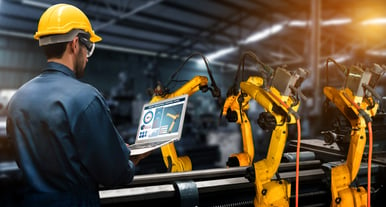Manufacturing Jobs Make More than Goods: They Make a Difference

To say that it's been challenging to pursue a career path in the past two years would be a huge understatement.
The onset of the pandemic in 2020 brought about mass layoffs in industries deemed non-essential: Now, two years later, we're still seeing its impact as companies struggle to find employees in the midst of an extreme skills shortage.
However, in spite of these uncertainties, manufacturing and light industrial positions have maintained a positive outlook.
Since the products of manufacturing roles are critical for our economy-and our daily lives-these jobs were among a select few that were protected from COVID-19 shutdowns. They are rightfully deemed some of the most essential positions in the workforce and offer tremendous potential to those looking to build their career.
Today, we will take a closer look at these industries, the opportunities they present, and the career benefits they have to offer.
The Manufacturing Industry
Manufacturing, in its broadest sense, is the industry responsible for taking raw materials and transforming them into finished, usable products.
Think of anything you use in your day-to-day life: for example, the computer or cell phone from which you're reading this article. Everything begins as parts and pieces which are made, assembled, tested, and packaged by employees in the manufacturing industry.
Manufacturing vs. Light Industrial Jobs-jpg.jpeg?width=403&name=iStock-980812576%20(1)-jpg.jpeg)
Some common examples of manufacturing jobs include machine operators, quality assurance inspectors, forklift operators, and maintenance technicians.
Light industrial jobs, on the other hand, can be thought of as a subset of manufacturing that is mainly focused on producing smaller-scale items. These typically involve more manual labor and lighter machinery.
Examples of light industrial positions include line attendants, assemblers, mixers and compounders, and material handlers.
While there are distinctions between these two categories, both play a critical role in creating goods that drive our economy, and both offer excellent opportunities for career success.
Why Work in Manufacturing
Job security
As we've mentioned, the labor force took a huge hit at the beginning of 2020 when the pandemic forced many businesses to close their doors, but manufacturing and light industrial jobs were largely spared.
Moreover, in light of the supply chain issues we're experiencing now, more companies are looking to increase domestic manufacturing. In fact, according to a report by Thomas, 83% of North American manufacturers anticipate reshoring/onshoring in the near future. For comparison, this percentage was just 54% in the first quarter of 2020.
This data suggests that in addition to the large number of existing manufacturing opportunities, even more are on the horizon.
Entry-Level Positions
The manufacturing industry is full of job opportunities that require little-to-no work experience, as most offer thorough hands-on training programs for new employees.
This is great for those looking to begin their career in manufacturing as well as those looking to avoid student debt from a four year university degree.
Since a college degree is usually not a requirement for manufacturing positions, they are a great way for high school graduates to start working and saving right away.
Room for Growth
While there are a lot of entry-level jobs in manufacturing, you can also find great long-term opportunities to advance your career path by working your way up to a management or supervisory position.
This is being seen a lot right now, as the baby boomer generation enters retirement. Industry veterans are leaving the workforce allowing the younger generation to follow them in pursuit of their career goals.
Another way you can advance your career is by working for a company that invests in employee upskilling/reskilling. These businesses might take an employee in a manufacturing role, for example, and teach them how to do a different type of job (like sales or operations.)
Diverse Opportunities
Manufacturing is involved in nearly every industry.
From the biggest commercial jets to the tiniest computer chips, manufacturing is responsible for everythingââ¬Â¦meaning there's a good chance you can work in a field that specifically appeals to you.
Working with materials in your field of interest gives you a unique view on how individual components come together to make the end product function. You also get an inside look at some of the cutting edge advancements that are improving the products your company makes.
Since manufacturing processes span so many industries, you can be sure to find a job that allows you to contribute to something you are passionate about.
Work With Advanced Technology
On the topic of cutting-edge tech, manufacturing jobs are often some of the first to adopt and
implement new technologies into their production efforts.
Things like wearable devices, 3D printing, robotics and drone technology are already being used in manufacturing jobs giving employees the opportunity to learn about and use these new technologies before the general public catches on.
Do Something You're Proud Of
Manufacturing and light industrial workers have the satisfaction of knowing that they are contributing to something greater than themselves.
It's a great feeling to see the tangible product of your hard work and to know that it would not have been possible without your contributions. The manufacturing industry is one of the great driving forces of our economy, and the products you help to build every day will impact the lives of everyone.
At FrankCrum Staffing, light industrial and manufacturing job placements are one of our specialties. Contact us today to speak with one of our recruiting experts about beginning or continuing your manufacturing career, or click here to browse our current openings!
